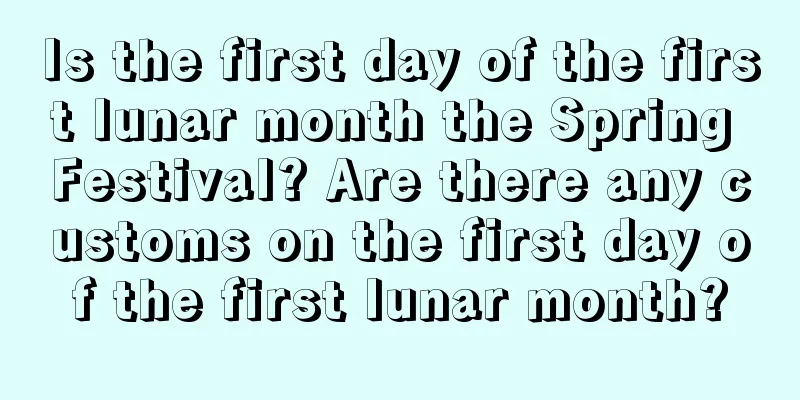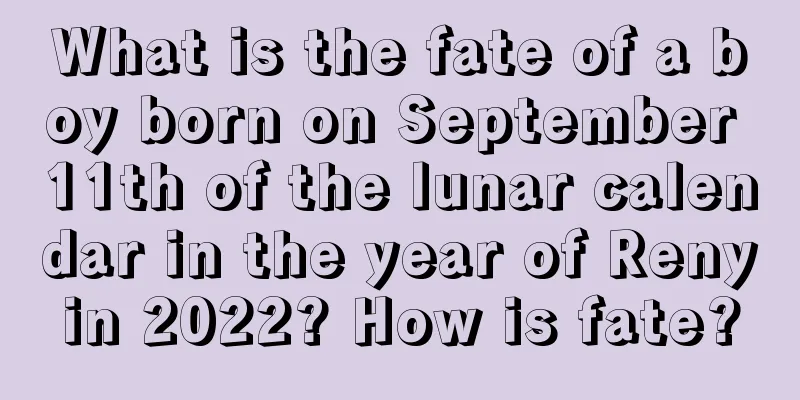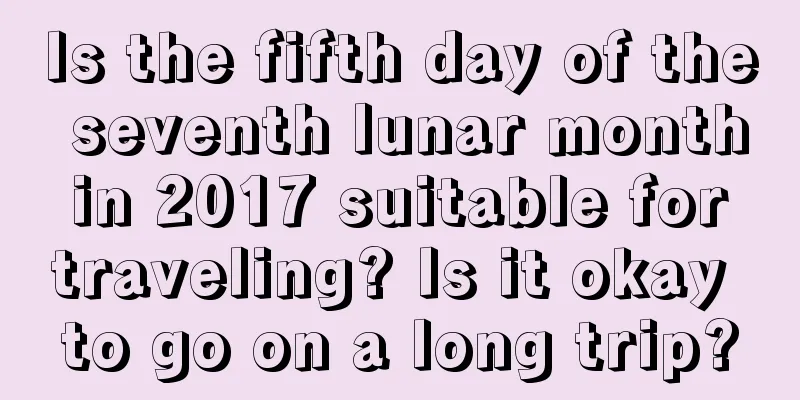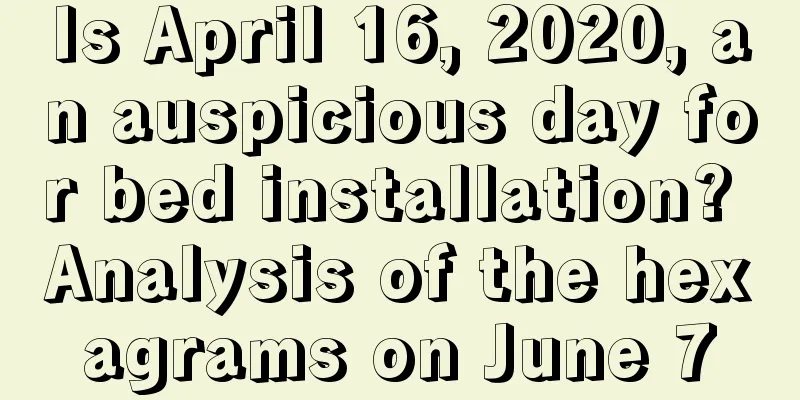Is the first day of the first lunar month the Spring Festival? Are there any customs on the first day of the first lunar month?

Introduction: The Spring Festival is a very important event for every Chinese, and the Spring Festival also has many customs and habits. Well, the first day of the first lunar month is the beginning of the Spring Festival. So are there any customs and habits about the first day of the first lunar month? Now, let’s follow the editor to take a look. In addition to the grand and festive celebrations of the Spring Festival, we also need to pay attention to some taboos regarding the Spring Festival. Next, let’s take a closer look at the Spring Festival special topic compiled by Mr. Shui Mo!What day is the first day of the first lunar month?The Spring Festival, commonly known as the Chinese New Year, was originally called New Year's Day. It is the most important and grand traditional festival of the Han nationality. The main folk activities include paying New Year's greetings, staying up all night, setting off firecrackers, pasting Spring Festival couplets, and giving out lucky money. In the Sui Dynasty, Du Taiqing said in "Wuzhu Baodian": "The first month of the year is the Duanyue, and the first day of the month is New Year's Day, also known as Zhengchao or Yuanshuo." The original meaning of "yuan" is "head", and later it was extended to "beginning". Because this day is the first day of the year, the first day of spring, and the first day of the first month, it is called "Sanyuan"; because this day is also the first day of the year, the first day of the month, and the first day of the day, it is also called "Sanchao"; and because it is the first new moon day, it is also called "Yuanshuo". The first day of the first lunar month is also known as Shangri, Zhengchao, Sanshuo and Sanshi, which means that the first day of the first lunar month is the beginning of the year, month and day.Introduction to the festival on the first day of the first lunar monthThe first day of the first lunar month was called Yuanri, Yuanchen, Yuanzheng, Yuanshuo, Yuandan, Suidan, Suishou, Suichao, Xinzheng, Shouzuo, Sanyuan or Nian, or New Year in ancient times. Since the first year of Taichu reign of Emperor Wu of Han Dynasty, the first day of the first lunar month in the Xia calendar (lunar calendar) has been regarded as the "Suishuo" (i.e. "year"), and the date of the New Year's Festival has been fixed and has continued to this day. The New Year’s Day was called “New Year’s Day” in ancient times. After the Revolution of 1911, the Gregorian calendar (solar calendar) was adopted to count years, and January 1 of the Gregorian calendar was called "New Year's Day", and the first day of the first lunar month was called "Spring Festival". The country attaches great importance to the protection of intangible cultural heritage. On May 20, 2006, the "Spring Festival" folk customs were approved by the State Council to be included in the first batch of national intangible cultural heritage list.The Spring Festival is also called the Lunar New Year, commonly known as "New Year" or "New Year". The Spring Festival symbolizes unity and prosperity, and is a festival that brings new hope for the future. According to records, the Han people have celebrated the Spring Festival for more than 4,000 years, and it was started by Yu Shun. One day more than two thousand years before Christ, Shun ascended the throne and led his subordinates to worship heaven and earth. From then on, people regarded this day as the beginning of the year, the first day of the first lunar month. It is said that this is the origin of the Lunar New Year, which was later called the Spring Festival. The Spring Festival was also called New Year's Day in the past. The month in which the Spring Festival falls is called Yuanyue. The first day of the first lunar month is the first day of the Lunar New Year. The Spring Festival is the most ceremonious and distinctive traditional festival among the Han people. It marks the end of the old year in the lunar calendar and the beginning of the new year. The Spring Festival generally refers to New Year’s Eve and the first day of the first lunar month. But among the Han people, the traditional Spring Festival refers to the period from the La Festival on the eighth day of the twelfth lunar month or the Kitchen God Festival on the twenty-third or twenty-fourth day of the twelfth lunar month to the fifteenth day of the first lunar month, with New Year's Eve and the first day of the first lunar month as the climax. During the Spring Festival, the Han ethnic group and many ethnic minorities in my country hold various activities to celebrate. The main contents of these activities are to worship gods, pay tribute to ancestors, get rid of the old and welcome the new, welcome the new year and pray for a good harvest. The activities are rich and colorful, with strong national characteristics. Origin of the festival"Shuowen Jiezi·Hebu": "Year, the harvest of grain. In the Xia and Shang Dynasties, the Xia calendar was created. The cycle of the waxing and waning of the moon was used as the month. A year was divided into twelve months. The first day of each month was the day when the moon was not visible. The first day of the first month was called Suishou, which was the beginning of the year, also called Nian. The name of the year began in the Zhou Dynasty and was not officially fixed until the Western Han Dynasty, and it has continued to this day. However, the first day of the first month in ancient times was called "New Year's Day". It was not until the victory of the Xinhai Revolution in modern China that the Nanjing Provisional Government stipulated that the Xia calendar should be used by the Han people in order to conform to the farming season and facilitate statistics. The Gregorian calendar was used in government agencies, factories, mines, schools and groups. The first day of the first month of the Gregorian calendar was New Year's Day, and the first day of the first month of the lunar calendar was called Spring Festival.On September 27, 1949, the People's Republic of China was founded. At the first plenary session of the Chinese People's Political Consultative Conference, the use of the world-wide Gregorian calendar was adopted. The first day of January in the Gregorian calendar was designated as New Year's Day, commonly known as the solar calendar year. The first day of the first lunar month is usually around the beginning of spring, so the first lunar month is designated as the "Spring Festival", commonly known as the lunar calendar year. An important activity during the Spring Festival is to visit relatives, friends and neighbors to wish them a happy new year, which was formerly known as New Year's greetings. The custom of New Year greetings among the Han people has already existed in the Han Dynasty. It became very popular after the Tang and Song dynasties. Some people did not need to go in person, but could send their congratulations using a business card. It was called "ci" in the Eastern Han Dynasty, so business cards are also called "mingci". After the Ming Dynasty, many families posted a red paper bag at the door to collect business cards, which was called "menbu". A brief introduction to the customs of New Year greetings on the first day of the first lunar month:The forms of mutual visits and New Year greetings among the Han people can be roughly divided into four categories according to their social relationships:Visiting relativesYou must go to your father-in-law's house on the first day of the new year and bring gifts. After entering the house, you should kowtow three times to the ancestral images and tablets, and then kneel down to pay respect to the elders in turn. You can stay to eat and play.A courtesy visitWhen you are greeting colleagues or friends, as soon as you enter the house, if you are of the same generation as the host, you only need to bow. If the host is older than you, you should still kneel down and the host should get up from his seat and pretend to support you.Saying "no need to be polite" repeatedly shows humility. In this situation, it is generally not advisable to sit for a long time. You should just say a few polite words and then leave. After accepting the worship, the host should choose a day to return the worship. A thank you visitAnyone who owes favors to someone in the previous year (such as lawyers, doctors, etc.) should buy some gifts and send them to express their gratitude during the New Year's greetings.A door-to-door visitPeople don't have much contact with neighbors on weekdays, but they can still talk to each other when they meet. During the New Year, they just go to the yard, clasp their fists together and say "Congratulations on your prosperity" and "Everything goes well for you" to each other, and then sit in the house for a while. There is no other etiquette.In ancient times, there was a distinction between New Year's greetings and New Year's congratulations: New Year's greetings were to wish the elders a happy new year; New Year's congratulations were for peers to congratulate each other. In some government agencies, recreational groups, enterprises, and schools, people gather together to congratulate each other, which is called "group greetings." Summary: Through the above article, we learned about some customs and habits on the first day of the first lunar month. I hope these contents will be liked by everyone. I wish you all smooth sailing and good luck in the new year! |
<<: What is the overall fortune of Scorpio in the Spring Festival of 2017?
>>: Why do we hang lanterns during the Spring Festival? What is the legend behind hanging lanterns?
Recommend
Is March 16th of the lunar calendar 2021 a suitable day to sign a contract? What are the things to note when signing a contract?
The third month of the lunar calendar is tradition...
Where is the God of Wealth on July 27, 2017?
1. What day is July 27th in the lunar calendar in...
Is it possible to get married or engaged on the third day of the ninth lunar month in 2017?
We have quietly stepped into a season full of har...
2019 Lunar May 17th Lunar Calendar Auspicious Time Query, 2019 Lunar May 17th Lunar Calendar Auspicious Time Query
The earthly branch of the fifth month in the luna...
Is it auspicious to build a house on the fifth day of June in 2019? Which direction is best to choose when building a house in 2019?
Introduction: Minor Heat is one of the 24 solar te...
Will it rain during the summer solstice in 2019? Is there any saying about rain during the summer solstice?
Introduction: The summer solstice is a sign that t...
Which days in May of the lunar calendar in 2020 are suitable for moving into a new house? How to choose an auspicious day for moving?
Introduction: You need to choose an auspicious day...
Is the eighth day of the seventh lunar month in 2021 suitable for moving? Is this an auspicious day?
Orchids are fragrant in July, so July is called th...
The Feng Shui of the grave is very important and has eight major effects on family members and descendants.
Introduction: Feng Shui is also an art of making ...
How about November 25, 2020? Is the funeral a good idea?
The pros and cons of funerals at different times a...
Can I move house on the second day of the Lunar New Year in 2022, the Year of the Tiger? Things to note when moving in the first month of the lunar year!
Moving at different times will have different effe...
What zodiac sign is Frost born in? What is the personality of people born in the year of Frost?
Frost Descent is a solar term that reflects the cl...
Is it bad for a baby girl to be born in April 2020? Analysis of the last day of April
Introduction: There is a leap April in 2020, and p...
Is December 26th of the lunar calendar 2021 a good day to get married? How about getting married today?
Different wedding days have different good and bad...
Is August 30th of the lunar calendar 2020 an auspicious day for travel?
Is August 30th of the lunar calendar 2020 an auspi...









